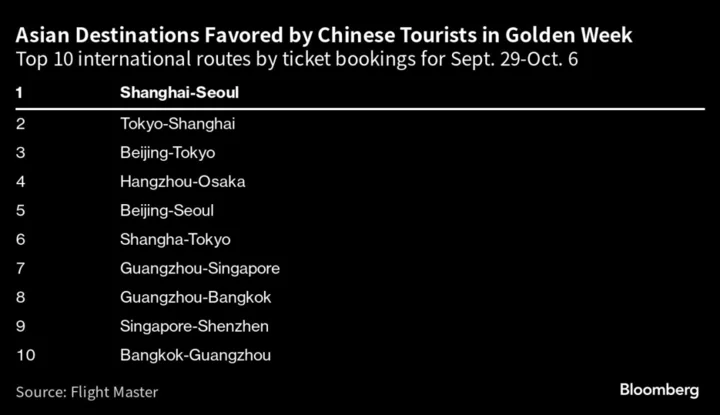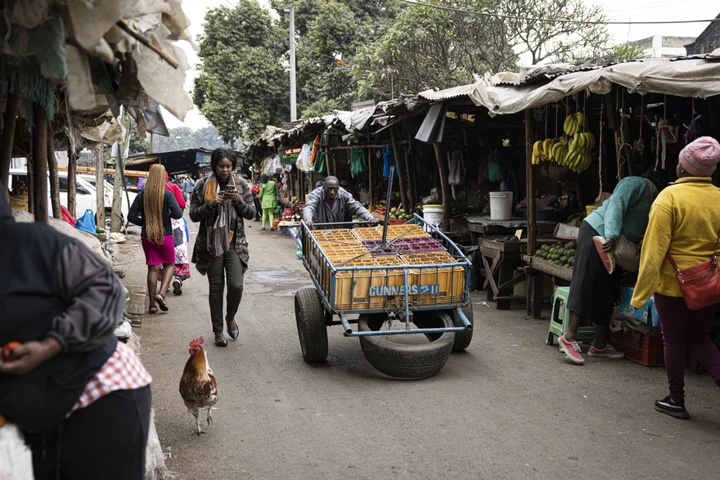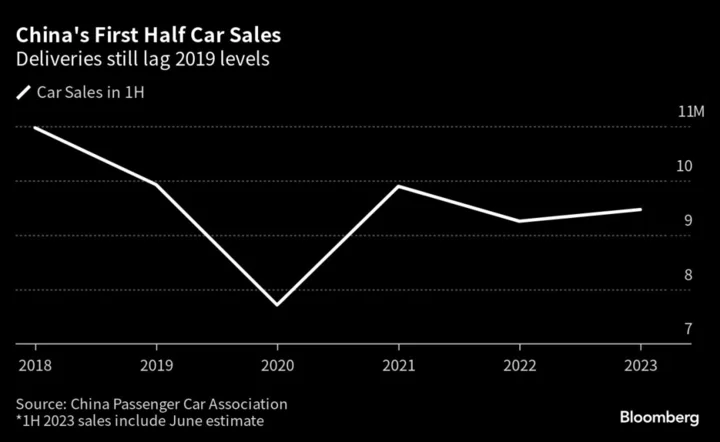After a strong summer, China’s travel market is about to get another boost as the Golden Week holiday arrives. More than 21 million people are expected to take flights in the space of eight days — the equivalent of almost everyone in Australia getting on a plane in a little over a week.
The Sept. 29-Oct. 6 holiday encompasses both Mid-Autumn festival and the National Day break, which doesn’t always happen as the date of the former depends on the lunar calendar. The extra day is a bonus after the population was essentially denied the opportunity to travel during the years of Covid-19.
“More than 21 million passengers will travel by air during the holiday period,” Jin Junhao, a deputy director at the Civil Aviation Administration of China, said at a briefing in Beijing on Sept. 15. Just domestically, there will be some 14,000 domestic flights a day, according to the regulator.
With Chinese tourists racing to book flights, airfares are climbing — by more than double on some of the more popular routes. Air China Ltd. economy-class tickets from Beijing to Chengdu on Sept. 29 are listed at 1,800 yuan ($250), compared with 680 yuan for Sept. 22. Long-haul international flights such as Shanghai-Sydney are also double or more than fares later in October.
Higher fares to some degree reflect the growing popularity of some of China’s more far-flung destinations, made more appealing by the longer holiday, online travel agency Tongcheng said in a report. Places such as Xinjiang, Tibet, Qinghai, Ningxia and Heilongjiang in the far northeast are among the most popular. There are more than 10 times the number of searches for Xinjiang-related travel packages than a year ago, according to the report.
The eight-day holiday also allows for longer travel. A study by data and analytics firm ForwardKeys found that 37% of travelers plan to stay in their destinations for six to eight nights, a 3 percentage point increase from 2019, before the pandemic.
“Air ticketing data also show that there has been an increase in bookings made by solo travelers and couples, something for tour operators, hoteliers, and retailers to keep in mind this Golden Week,” Nancy Dai, an analyst with ForwardKeys, wrote in the report. “For young travelers, personalized options that meet their needs are becoming even more popular,”
Outbound travel is also finally picking up, with momentum gathering after Chinese authorities lifted a ban on group tours in August. Favorable entry policies in countries like Thailand have also helped. Data from flight-tracker Umetrip show bookings for international routes are approaching 1 million for the holiday period.
Trip.com said outbound travel bookings on its platform are nearly 20 times higher than the holiday last year, when China still had rigid Covid policies such as mandatory quarantine and testing. Thailand, South Korea, Malaysia, Singapore, Australia and the UK are among the most popular overseas destinations.
According to data from Flight Master, bookings between Tokyo and China’s two largest cities Shanghai and Beijing are among the top 10 international routes for the holiday period.
China’s regulator has called on airlines to add shifts and use widebody aircraft on busy routes. Jin said carriers should also explore opportunities to serve smaller Chinese cities.
Read More: Boeing Says China Will Account for 20% of Global Plane Demand
“The CAAC encourages domestic and foreign operators to increase capacity investment in the international air transport market and actively resume international flights,” Jin added.
The boom in demand leading up to the Golden Week holiday lifted China’s air passenger traffic to record highs for two consecutive months in July and August. That’s some long overdue relief for the likes of China’s three leading airlines, which were hit hard by the pandemic’s impact on travel — Air China, China Southern Airlines Co. and China Eastern Airlines Corp. posted combined losses of about 200 billion yuan from 2020 to midway through this year.









